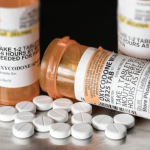LOS ANGELES (Reuters)—A Southern California doctor was sentenced to 30 years to life in prison on Friday for over-prescribing drugs that caused the fatal overdose of three patients in a murder case capped by the first conviction of its kind in the U.S.
The case against Dr. Hsiu Ying “Lisa” Tseng, 46, comes amid what public health officials describe as a national epidemic of drug abuse. The Centers for Disease Control and Prevention has said the trend is fueling nearly 17,000 overdose deaths annually, as well as a rise in heroin addiction.
A Los Angeles County Superior Court jury in October convicted Tseng, who specialized in internal medicine, of three counts of second-degree murder in a case prosecutors said showed she put greed above patients’ wellbeing.
She was also found guilty of 19 counts of unlawfully prescribing a controlled substance and one count of obtaining a controlled substance by fraud.
Under the sentence imposed on Friday, Tseng must serve at least 30 years in prison before she is eligible for parole. She has been in custody since March 2012.
Criminally prosecuting physicians for patients’ deaths is relatively rare, with one notable case being the 2011 involuntary manslaughter conviction of Dr. Conrad Murray for giving pop star Michael Jackson a fatal dose of a surgical anesthetic to help him sleep.
Prosecutors said Tseng’s conviction, the culmination of a six-week trial, marked the first time in which a U.S. physician was found guilty of murder for over-prescribing drugs.
Licensed to practice in 1997, Tseng opened a storefront medical office in 2005 in Rowland Heights, a hillside community east of Los Angeles that is home to many upper-middle-class and wealthy immigrants from China, Taiwan and South Korea.
At the trial, prosecutors pointed to nine overdose deaths associated with Tseng’s practice in less than three years, during which they said she had made $5 million from her clinic, dispensing potent, addictive medications to people who did not need them.
The drugs included powerful narcotics such as oxycodone, methadone and hydrocodone, and sedatives like Xanax and Valium.
She was convicted in the 2009 deaths of three patients—Vu Nguyen, 28, Steven Ogle, 24, and Joseph Rovero, 21. None resided anywhere near Rowland Heights, and one, Rovero, was an Arizona State University student from the San Francisco area.
Tseng, who received her medical degree from Michigan State University, surrendered her medical license prior to arrest. Her federal license to prescribe drugs was revoked.

